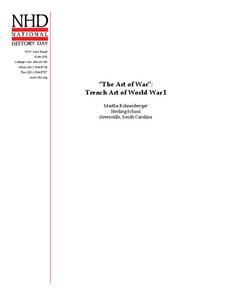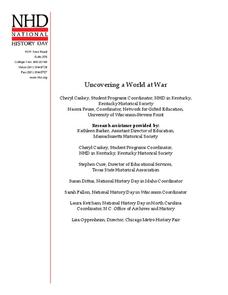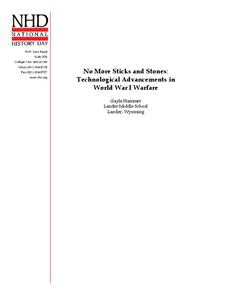PBS
NOVA RNA Lab Lesson Plan
Scholars learn the differences between RNA and DNA through discussion, virtual labs, worksheets, and video quizzes. They build their knowledge of molecular biology with support from video clips and handouts.
Center for Civic Education
The Power of Nonviolence: Rosa Parks: A Quest for Equal Protection Under the Law
Teach young historians about the historical legacy of Rosa Parks with a multi-faceted lesson plan. Pupils follow stations and use journals to explore prominent events, analyze primary resource documents, and engage in interesting...
Montana State University
Ice in Action
Make your own bite-size glacier! A resource teaches about the formation and melting of ice. Activities include videos, a hands-on activity where your pupils build glaciers, and a photographic analysis to teach individuals the chilling...
Montana State University
What's the Weather?
How many jackets do you need to stay warm and climb Mount Everest? An informatie resource covers the topic of Mount Everest, the resource helps young scientists discover the difference between climate and weather. Activities include...
PBS
Women's History: Parading Through History
Want to teach your pupils about debate, effective speech techniques, propaganda, and the women's movement? The first in a sequential series of three, scholars analyze real propaganda images from the the historic women's movement, view a...
Roald Dahl
Charlie and the Chocolate Factory
The Charlie and the Chocolate Factory unit is a golden ticket for teachers looking for nicely written plans. Elementary and middle schoolers draw their impressions of characters, design and market their own candy creations, and use...
National History Day
Heroes Who Made a Difference: Memorializing a Distinguished Service Cross Award Recipient
Ever wonder how to memorialize World War I heroes in the classroom? Activities in a high-quality social studies resource prompt middle schoolers to research Internet sources, complete a graphic organizer, and write an editorial feature...
National History Day
More Than Mud and Cooties: The Poetry of World War I Soldiers
Poetry is not just for romance. Teach middle schoolers about soldiers' experiences during World War I with poetry written by the soldiers themselves. The instructional activity includes a simulation activity, a graphic organizer...
National History Day
“War Is Hell. We Know it Now.” American Soldiers in the Meuse-Argonne Offensive
Understanding the soldier's experiences during World War I sometimes takes a newscast. Learners see the importance of understanding multiple points of view with a newscast project surrounding the Meuse-Argonne Offensive. Compare and...
National History Day
“The Art of War”: Trench Art of World War I
Teach pupils how veterans used art to deal with PTSD and shell-shock from trench warfare during World War I. Scholars use graphic organizers, a cartoon analysis sheet, and their own inferences to analyze primary source art work by veterans.
US Institute of Peace
Identifying Conflict Styles
Are you a peace-keeper or a problem-solver? Explore conflict management styles through a lesson, fourth in a 15-part series, that combines individual assessment and collaborative work. Groups learn the basic tendencies of each style,...
Roald Dahl
The Twits - The Furniture Goes Up
Work gets done faster when people work as a team. The ninth installment of an 11-lesson unit designed to accompany The Twits by Roald Dahl combines character education with research skills and creative writing activities. The lesson ends...
National History Day
Uncovering a World at War
Has media always had an influence on public policy? After researching and reading news articles written during World War I, learners understand the influence of communication and media. They discuss articles in small groups and as a...
National History Day
No More Sticks and Stones: Technological Advancements in World War I Warfare
Remind young historians that many technological advancements influenced the events of World War I. After analyzing technology's evolution through primary sources, discussing the changes over time, and watching various video clips,...
National History Day
World War I Propaganda: Targeting all Americans to Join the War Effort
Is propaganda from World War I any different than the propaganda of today? Class members learn about the effectiveness of advertising and its influence on American's behavior. Activities include a propaganda think sheet, assessments of...
National Endowment for the Humanities
People and Places in the North and South
North and South: two opposite directions and two opposite economic and social systems in time of the Civil War. Pupils peruse census websites and primary source photographs to understand what life was like for the everyday person before...
Generation Rx
My Generation Rx: Minute Activities
Want to discuss the prevalence of prescription drug abuse among teenagers, but running out of class time? A series of short, straightforward activities address topics such as sharing prescription drugs, coping mechanisms for stress, and...
Scholastic
A Reading Guide to A Wrinkle in Time
Accompany a reading of Madeleine L'Engle's classic tale, A Wrinkle in Time, with a detailed guide equipped with 15 informative and useful chapters. Scholars discover who the author is, why she wrote the book, and crucial story elements...
Generation Rx
Medication Safety for Teens
The most valuable way to protect teenagers from prescription drug abuse is to equip them with knowledge. An informative slideshow covers various aspects of prescription drug safety, including the importance of keeping one's prescription...
Broward County Schools
Women's Contributions to the United States
Betsy Ross, Toni Morrison, Sacajawea, Amelia Earhart, Maya Lin, Sally Ride, Judy Baca. No matter the subject area or the grade level you teach you will find much to value in a manual that focuses on the contributions U.S. women have...
Science 4 Inquiry
Trick or Science: Catching the Light
Your class might be surprised to learn that mirrors have been around since the first century AD! Young scientists explore reflection and refraction of light through a series of challenges. They use this knowledge to design their own...
Science 4 Inquiry
Rocks Makin' Rocks: Rock Cycle Simulation
Scholars review prior knowledge before completing a hands-on simulation of the rock cycle. They write stories or songs summarizing their simulations to demonstrate mastery.
Science 4 Inquiry
Layers of the Earth
We can't dig a hole through the Earth, so how do we know about the layers beneath our feet? Scholars learn about layering through hands-on exploration of common materials. They study the characteristics of each layer and apply their...
Science 4 Inquiry
Layers and Laws: The Law of Superposition and Index Fossils
What can layers of rock teach us about the climate? Young scientists solve a mystery about who stole a cookie by applying the law of superposition. Then, they apply the same concept to solve a more difficult mystery, trying to determine...

























